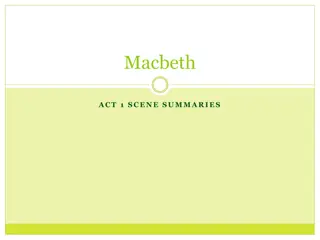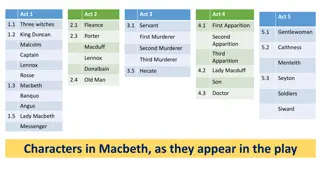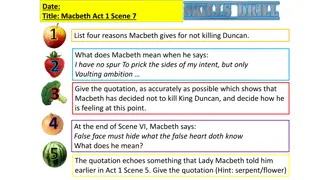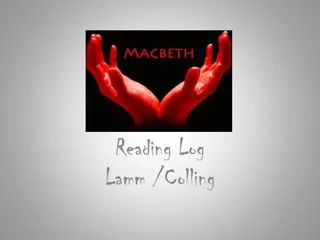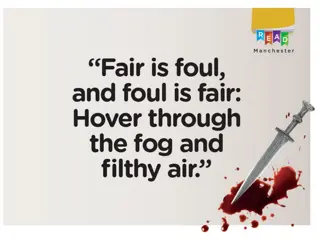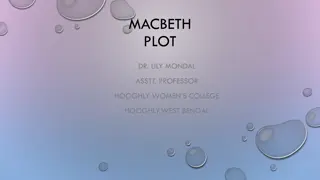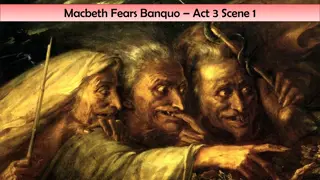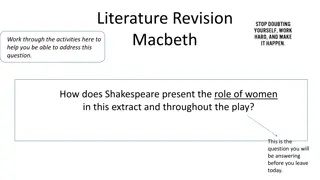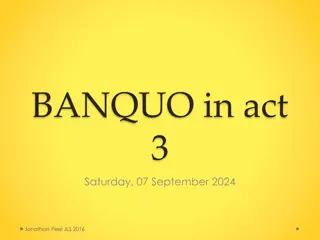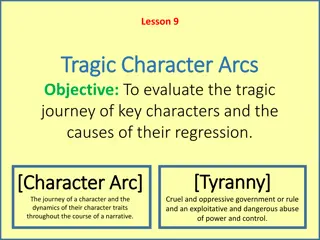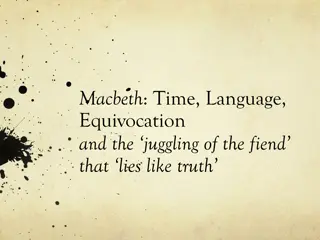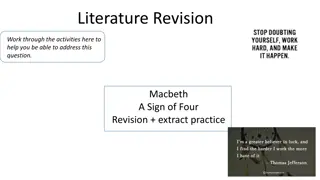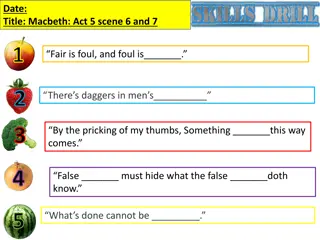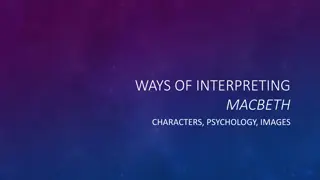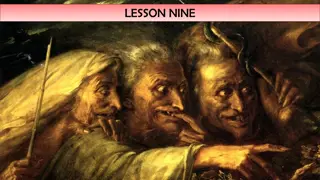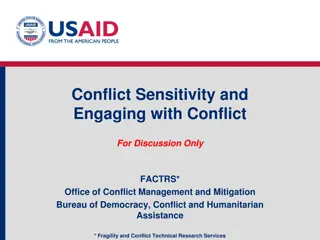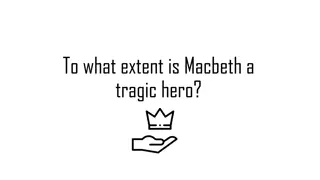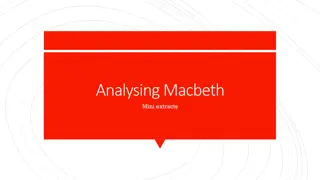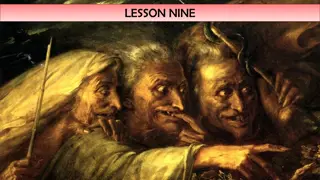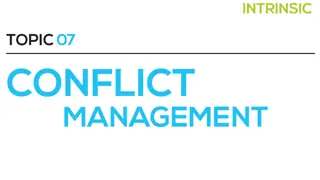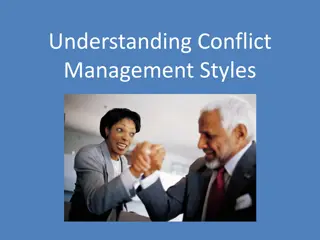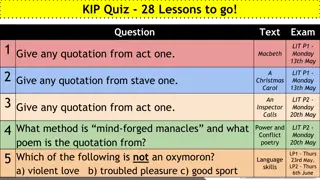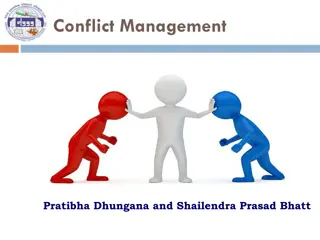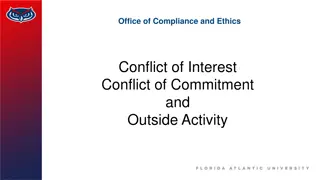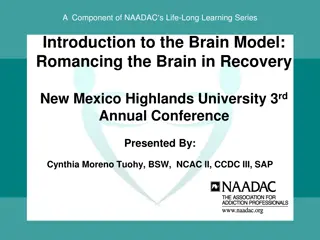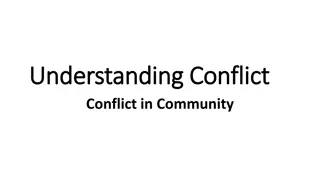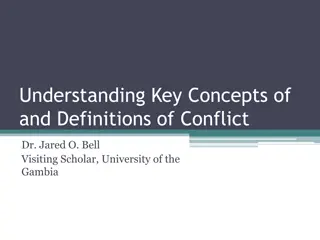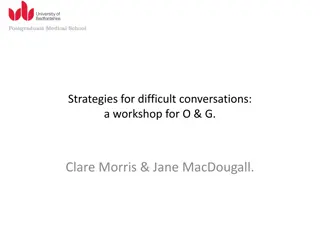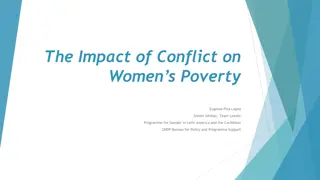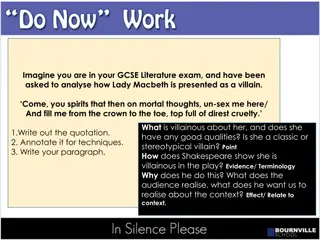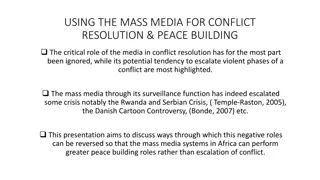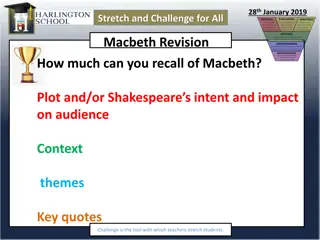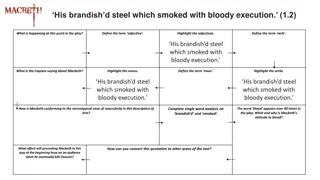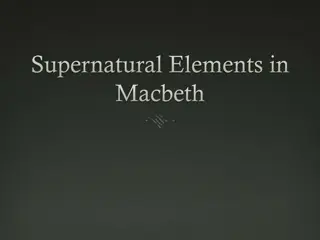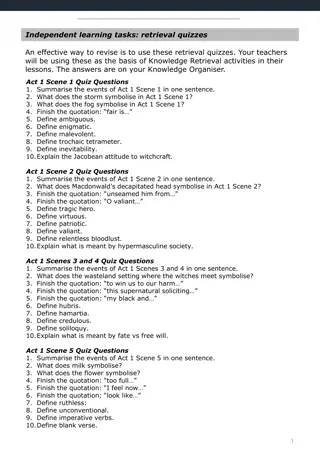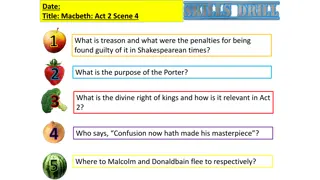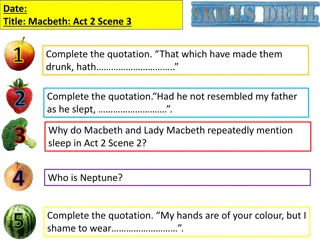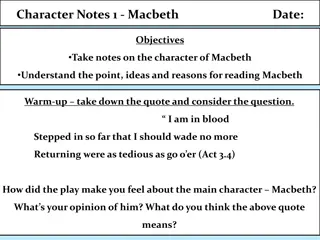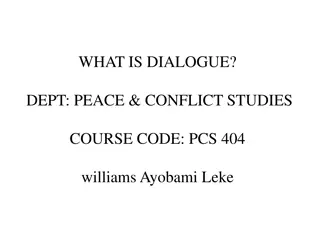Understanding Conflict and Regicide in Macbeth
Explore the themes of ambition, conflict, and regicide in Shakespeare's Macbeth through a detailed analysis of Act 2. Delve into the character motivations, catalysts of conflict, and the consequences of regicide as seen through the murder of King Duncan. Unravel the tensions and complexities that arise from characters driven by ambition and power, leading to a clash of opposing forces with grave consequences.
Download Presentation

Please find below an Image/Link to download the presentation.
The content on the website is provided AS IS for your information and personal use only. It may not be sold, licensed, or shared on other websites without obtaining consent from the author. Download presentation by click this link. If you encounter any issues during the download, it is possible that the publisher has removed the file from their server.
E N D
Presentation Transcript
Lesson 4 Ambition and Regicide Ambition and Regicide Objective: To consider how the goals of certain characters are catalysts of conflict in the narrative. [Conflict] [Conflict] A clash between two opposing forces that creates pressure. [Catalyst] [Catalyst] A person or thing that precipitates an event causing a reaction. [Regicide] [Regicide] The action of killing a king, queen or monarch.
TEACHERS GUIDE Lesson Structure 4 Ambition & Regicide Objective To consider how narrative tension increases with the representation of conflict. Starter Act 1 Comprehension Quiz Reading Act 2 Scene 2 Macbeth s Murder of King Duncan. Scene Analysis PPTs Act 2 Scenes 1-2 Film Clip (on estream Macbeth Fassbender version) 32:00-36:00 -violent scene artistic license) 38:30 - I have done the deed . Main (optional could be set as Homework tasks). PEEL Paragraph How does Shakespeare present the theme of regicide in Act 2 Scene 2? Plenary Peer assess PEEL paragraph Homework or Class Timed Writing Task based on success criteria. Key terms Catalyst, Regicide, Conflict.
ACT 1 COMPREHENSION QUIZ Resource Resource To Be To Be Confimed Confimed
CLASS READING Act 2 Scene 2 Act 2 Scene 2 Macbeth s Murder of King Duncan Macbeth s Murder of King Duncan
PEEL TASK How does Shakespeare present the theme of regicide in Act 2 Scene 2?
KEY SYMBOLS WITH QUOTATIONS "If chance will have me king, why, chance may crown me (Act 1, Scene 3) "Is this a dagger which I see before me ? (Act 2, Scene 1) Will all the water in the ocean wash this blood from my hands? (Act 2, Scene 2) Out, out damned spot! (Act 5, Scene 1) (Act 4, Scene 1) Out, out, brief candle. Life s but a walking shadow, a poor player That struts and frets his hour upon the stage, And then is heard no more. It is a tale Told by an idiot, full of sound and fury, Signifying nothing. (Act 5, Scene 5) Unsex me here "Come, thick night, And pall thee in the dunnest smoke of hell, (Act 1, Scene 5) Fear not, Macbeth. No man that s born of woman. Shall e er have power upon thee. (Act 5, Scene 3) Look like th innocent flower/But be the serpent under t. (Act 1, Scene 5)
Act 2 Scene 1 Analysis Act 2 Scene 1 Analysis Banquo and Fleance up and awake in the courtyard on a starless night (the way things are in the natural world reflects the state of things in the play evil has taken hold). - Banquo admits he is having trouble sleeping unsettled by the witches prophecies. - Banquo (in contrast to Macbeth and particularly Lady Macbeth) looks to merciful powers to help him rather than evil spirits. - Another contrast Banquo and Duncan Duncan was effusive in his praise and lavish in his compliments when he arrives at my best castle, Banquo is on guard and on edge he asks for a sword when he hears someone approaching he is in a friend s castle where supposedly no harm can come to him he is paranoid and suspicious. - Macbeth suggesting something through subtext - If you shall cleave to my consent when tis, it shall make honour of you. he hints at some event in the future encouraging Banquo s loyalty. - Banquo s response - So I lose none in seeking to augment it, but still keep my bosom franchised and allegiance clear, I shall be counselled. I will be compliant as long as I don t lose honour. Macbeth s troubled state of mind about his plan to kill Duncan is this the dagger I see before me? hallucination of bloody dagger leading him towards Duncan s room the dagger is pointing him to the way that he is already going a fevered mind and mental pressure. Shakespeare - used many metaphors about hidden identities and false face and now Banquo is now calling on Macbeth to reveal himself. Macbeth/Lady Macbeth have called for the stars not to shine on their deeds and hide their intentions irreversible.
Act 2 Scene 2 Analysis Act 2 Scene 2 Analysis Macbeth has murdered Duncan (off stage) (holds the bloodied dagger on stage after committing the crime) I have done the deed do we sympathise with Macbeth? (courageous, ambitious, is persuaded by witches and wife to become overly ambitious, schemes murder of innocent King with wife, goes against decency and morality, kills more people indiscriminately to maintain his ill-gotten gain, ultimately sees errors of his ways and falls from his position). Irony - the expression of one's meaning by using language that normally signifies the opposite, typically for humorous or emphatic effect. Lady Macbeth responds: why did you bring the dagger from this place, it must lie there (Macbeth is full of borderline hysterical fear) do we sympathise with her? she admits that she tried to murder Duncan herself resembled my father as he slept she couldn t bring herself to do it. Internal conflict - Confident and mastery of language from Macbeth and Lady Macbeth exists in previous scenes but not in this one both of them are on edge Lady Macbeth is particularly troubled (she jumps at the sound of an owl) Hark! Peace! - Macbeth behaves as if he is in a trance he appears not to care if he is caught or not and indulges in self-reproach whilst Lady Macbeth desperately tries to bring him round. Famous irony in the play Lady Macbeth urges her husband to wash the blood from his hands a little water clears us of this deed extended metaphor that we see in the rest of the play images of blood and water are used to show the murderous deeds which are impossible to wash away Lady Macbeth returns to this image later in the play when she is close to insane real contrast between both characters in this scene. The dagger as a metaphor for his guilt the fact that he has brought the weapon with him implicates if caught red-handed exposes her to the crime a vision which later haunts her dreams. Symbolic knocking at the gate symbolises the reality outside the castle gates not immediately poisoned by his deeds this symbol is extended in the next scene: knocking at the gates of hell. - In Act 1 Lady Macbeth dedicates herself to evil, becomes possessed by demons and now, the castle becomes plagued by this Duncan is led by the hand into this doomed building and never emerges. - the stars over the castle no longer shine later: the murder of Duncan upsets the balance of nature. - the knocking wakes Macbeth and Lady Macbeth from the dark and murderous revelry it makes the deed shocking, raw and real (consider: Peter s denial of Jesus three times and the cock crowing the sign grounding the misdeed in reality). Regicide - the deliberate killing of a monarch.
The Jacobean Era Elizabeth I and James I Historical Context Historical Context When Queen Elizabeth died in 1603, she had no children, or even nephews or nieces. The throne was offered to James Stuart, James VI of Scotland, who then became James I of Britain. Brought up by Protestant regents, James maintained a Protestant regime in Scotland when he came of age, and so was an acceptable choice for England which had become firmly Protestant under Elizabeth. James was a distant cousin of Elizabeth his ascension as King caused controversy amongst Catholic relatives (leading to Gunpowder Plot). Shakespeare was writing for the theatre during the reigns of two monarchs, Queen Elizabeth I and King James I. The plays he wrote during the reign of Queen Elizabeth, such as A Midsummer Night's Dream , are often seen to embody the optimistic mood of the Elizabethans. However, those he wrote during James's reign, such as Macbeth and Hamlet , are darker and more cynical, reflecting the insecurities of the Jacobean period. 1040 Macbeth is set in Medieval Scotland 1606 Macbeth is written in the Jacobean Era The Gunpowder Plot Shakespeare and James I The Divine Right of Kings Certain Catholics (Robert Catesby, Thomas Percy, Guy Fawkes and a few others) turned to terrorism during James I s Protestant rule, trying to blow up the Houses of Parliament in 1605. Macbeth was written the year after the Gunpowder Plot of 1605 and is considered a piece of propaganda in support of King James the message of the play: perpetrators of regicide will eventually receive their comeuppance. The conspirators were betrayed, and horribly tortured on the rack until they confessed. They were then executed in the most brutal fashion as a warning to other would-be traitors. Shakespeare s Macbeth wove direct references to the Plot including King James snake/flower medal. Whilst the present Queen claims constitutional impartiality, in the European Middle Ages, the Divine Right of Kings was a dominant concept. The idea claimed that kings were answerable only to God and it was therefore treachery to challenge them. To kill the king (regicide) was to challenge the direct of authority of God and was considered an unforgivable sin . James I ruled under the notion of the divine right of Kings . Shakespeare's play Macbeth may be a cautionary tale, warning any other potential regicides (king-killers) of the awful fate for this crime. Macbeth s victim, King Duncan is presented by Shakespeare as a noble, divinely- appointed ruler. Killing Duncan has catastrophic consequences for Macbeth and Scotland. Duncan could be a representation of James but might also allude to King Edward s healing the sick: 'such sanctity hath heaven given his hand'. Religious Beliefs Lady Macbeth and Role of Women in Jacobean Society The Real Macbeth Religious thinkers in the Middle Ages had upheld the idea of 'The Great Chain of Being'. This was the belief that God had designed an ordered system for both nature and humankind within which every creature and person had an allotted place. It was considered an offence against God for anyone to try to alter their station in life. In addition, madness was often seen as a moral issue, either a punishment for sin or a test of faith and character. Macbeth was a real 11th century Scottish king, but the historical Macbeth, who had a valid right to the throne, reigning in Scotland from 1040-57. He succeeded Duncan, whom he had defeated in battle, but the real Duncan was weak and a younger ignoble King. In reality, Macbeth was succeeded by his own stepson, not Malcolm, who came to the throne later. Banquo is a mythical figure. Shakespeare found his version of the story of Macbeth in the Chronicles of Holinshed Jacobean society was patriarchal (much like the majority of Western history). Female characters in Shakespearean tragedies were often passive (Hamlet s Ophelia submits stating I shall obey my Lord and Othello s Desdemona states To you I am bound . However, Lady Macbeth is a cunning, manipulative and dominant woman who is associated with the supernatural. Her introduction in Act 1 Scene 5, subverting submission when she stops reading Macbeth s letter, criticizes his nature as too full o th milkof human kindness . This behavior is controversial within the societal confines of a masculine hegemonic era in medieval Scotland. Regardless of her heroism or villainy, she is a radical figure for the era.
Macbeth Lady Macbeth King Duncan Banquo Macduff Macbeth is a Scottish general and the Thane of Glamis who is greeted by prophecies from three witches that he will be made Thane of Cawdor. This comes true. He longs to become King and is then tempted into murder (partly by Lady Macbeth) to fulfill his ambitions to the throne. Once he commits his first crime (killing King Duncan), he is crowned King of Scotland. He is brave but not virtuous. Macbeth is courageous on the battlefield but ill-suited to politics, quickly becoming a tyrant. He becomes suspicious of even his close friends like Banquo. His response to every problem is violence and murder. Macbeth is never comfortable in his role as a criminal and this leads to a psychological regression. Macbeth s wife, a deeply ambitious woman who lusts for power and position. Early in the play she seems to be the stronger and more ruthless of the two, as she urges her husband to kill Duncan and seize the crown. After the bloodshed begins, Lady Macbeth falls victim to guilt and madness to an even greater degree than her husband. Her conscience affects her to such an extent that she eventually commits suicide. Interestingly, she and Macbeth are presented as being deeply in love, and many of Lady Macbeth s speeches imply that her influence over her husband is primarily sexual. Their joint alienation from the world, occasioned by their partnership in crime, seems to strengthen the attachment that they feel to each another. A Scottish nobleman hostile to Macbeth s kingship from the start. He eventually becomes a leader of the crusade to unseat Macbeth. The crusade s mission is to place the rightful king, Malcolm, on the throne, but Macduff also desires vengeance for Macbeth s murder of Macduff s wife and young son. The good King of Scotland whom Macbeth, in his ambition for the crown, murders. Duncan is the model of a virtuous, benevolent, and farsighted ruler. His death symbolizes the destruction of an order in Scotland that can be restored only when Duncan s line, in the person of Malcolm, once more occupies the throne. The brave, noble general whose children, according to the witches prophecy, will inherit the Scottish throne. Like Macbeth, Banquo thinks ambitious thoughts, but he does not translate those thoughts into action. In a sense, Banquo s character stands as a rebuke to Macbeth, since he represents the path Macbeth chose not to take: a path in which ambition need not lead to betrayal and murder. Appropriately, then, it is Banquo s ghost and not Duncan s that haunts Macbeth. In addition to embodying Macbeth s guilt for killing Banquo, the ghost also reminds Macbeth that he did not emulate Banquo s reaction to the witches prophecy. KEY CHARACTERS IN MACBETH Malcolm - The son of Duncan, whose restoration to the throne signals Scotland s return to order following Macbeth s reign of terror. Malcolm becomes a serious challenge to Macbeth with Macduff s aid (and the support of England). Prior to this, he appears weak and uncertain of his own power, as when he and Donalbain flee Scotland after their father s murder. Hecate - The goddess of witchcraft who works to enact her mischief on Macbeth (one of the three witches). Fleance - Banquo s son, who survives Macbeth s attempt to murder him. At the end of the play, Fleance s whereabouts are unknown. Presumably, he may come to rule Scotland, fulfilling the witches prophecy that Banquo s sons will sit on the Scottish throne. Macdonwald Traitor to the King whose army is defeated in battle by Macbeth and executed by King Duncan. Lennox - A Scottish nobleman. Ross - A Scottish nobleman. The Murderers - A group conscripted by Macbeth to murder Banquo, Fleance, Macduff s family (fails). Porter - The drunken doorman of Macbeth s castle. The Three Witches Three black and midnight hags who plot mischief against Macbeth using charms, spells, and prophecies. Their predictions prompt him to murder Duncan, to order the deaths of Banquo and his son, and to blindly believe in his own immortality. The play leaves the witches true identity unclear aside from the fact that they are servants of Hecate, we know little about their place in the cosmos. In some ways they resemble the mythological Fates, who impersonally weave the threads of human destiny. They clearly take a perverse delight in using their knowledge of the future to toy with and destroy human beings.
Key Terms Glossary Key Terms Glossary Language Structure/Narrative Context/concept Analogy - comparison between one thing and another, typically for the purpose of explanation or clarification. Catalyst an element which enters a narrative which causes a reaction usually an increase in conflict and tension. Ambition - desire and determination to achieve success. Emotive language - describes words and phrases meant to evoke an emotional response to a subject. Dramatic irony when the audience is aware of information that the character is not aware of. Hierarchy system where citizens are ranked according to relative status or authority. Iambic Pentameter - a line of verse ten syllables in length each consisting of one short (or unstressed) syllable followed by one long (or stressed) syllable. Enigma mystery and ambiguity developed for dramatic effect withholding of information for the purposes of the narrative. Historical context - refers to the moods, attitudes, and conditions that existed during a certain time. Imperatives command words (usually verbs). Foreshadowing - a warning and indication of a future event. Hubris excessive pride which inevitably leads to one s downfall. Oxymoron - a figure of speech in which apparently contradictory terms appear in conjunction example: fair is foul and foul is fair Irony - the expression of one's meaning by using language that normally signifies the opposite, typically for humorous or emphatic effect. Loyalty - giving or showing firm and constant support or allegiance. Personification human characteristics given to a nun-human form. Motif a repletion of a certain idea or symbol in a narrative Machiavellian - cunning, scheming, and unscrupulous, especially in politics Pun - a joke exploiting the different possible meanings of a word or the fact that there are words which sound alike but have different meanings. Semantic Field - a lexical set of semantically related items, or simply, words and phrases with a similar meaning or context to the subject. Patriarchy - a system of society or government in which men hold the power and women are largely excluded from it. Rhetorical question - a question asked in order to create a dramatic effect or to make a point rather than to get an answer. Suspense - a state or feeling of excited or anxious uncertainty about what may happen Regicide - the deliberate killing of a monarch Soliloquy - an act of speaking one's thoughts aloud when by oneself especially by a character in a play. Tyranny - cruel and oppressive government or rule.
Plenary Plenary [In books] PEEL paragraph Homework or Class Timed Writing Task based on success criteria.


